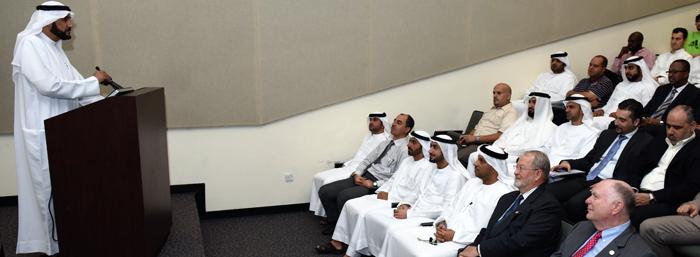- About
- Admissions
- Study at AUS
- Prospective Students
- Bachelor's Degrees
- Master's Degrees
- Doctoral Degrees
- Admission Publications
- International Students
- Contact Admissions
- Grants and Scholarships
- Sponsorship Liaison Services
- Testing Center
- New Student Guide
- File Completion
- New Student Orientation
- Payment Guide
- Executive Education
- Students with Disabilities
- Academics
- Life at AUS
- Research
- Contact Us
- Apply Now
- .

SEWA Chairman urges AUS students to turn knowledge into sustainable action
True sustainable development can only be achieved when economic, social, environmental, religious and cultural objectives are aligned, said Dr. Rashid Al Leem, Chairman of the Sharjah Electricity and Water Authority (SEWA), during a lecture delivered at American University of Sharjah (AUS) today, May 27, 2015.
"I am pleased to welcome you to this special event being held as part of the Chancellor's Distinguished Lecture Series, in cooperation with the AUS college of Engineering," said Dr. Björn Kjerfve, Chancellor of AUS, in his opening remarks. The chancellor welcomed Dr. Al Leem, and said that the speaker was "widely considered a visionary and a thought leader in business, socioeconomic, academic and cultural endeavors."
Dr. Al Leem served as the Director General of the Sharjah Department of Seaports and Customs and the Sharjah Free Zones Authorities and was the driving force in transforming them into strategic commercial hubs that have empowered thousands of businesses in the region.
During the lecture, entitled "Sustainability: Fiction or Fact," Dr. Al Leem said that development is sustainable only when the needs of the present do not compromise the ability of future generations to meet their own needs. He said that "sustainability" is one of the most misunderstood terms today as people only believe it to be a balance between economic and social aspects, while in reality sustainable development can only occur when economic, social, environmental, religious and cultural objectives are met.
Elaborating the concept further, he described the various objectives involved. He stated that the economic objective is about actions that affect how people and businesses meet their economic needs; the social aspect involves actions and conditions that affect all members of society; the environmental objective revolves around actions and conditions that affect the earth's ecology and climate; culture is about actions through which communities manifest their identity and cultivate traditions from generation to generation; and finally the religion/faith objective encompasses timeless participles, values and belief systems.
He urged the students present in the audience to imbibe knowledge but also to ensure that that knowledge is turned into action for the betterment of society. He also listed a number of principles which they could focus on to help them achieve this aim. Dr. Al Leem shared the work being done by the Alleem Foundation, which helps individuals and innovative organizations to improve social, economic and environmental living conditions worldwide thereby helping to improve the quality of life for hundreds of millions who have not yet seen the benefits of sustainable development.
Dr. Al Leem is the recipient of numerous national and international awards. Some of these include the Achievement Award given by the League of Arab States; a Gold Medal from the Mayor of Cannes for environmental efforts; an Excellence in Leadership Award from The Associated Chambers of Commerce and Industry (ASSOCHAM) in India; and being declared the 'Celebrity of the Year' by Khaleej Times. He has also been recognized as 'Maritime Personality for 2009' by Marine Biz TV and received the Middle East Business Leaders Award 2012 as a tribute to his acumen in training and human capital development. Dr. Al Leem has authored many books and articles in journals and magazines in both Arabic and English, including his recent book My Leadership Secrets.
The event was attended by a large audience that included senior AUS and SEWA officials, faculty members, students and members of the public.

